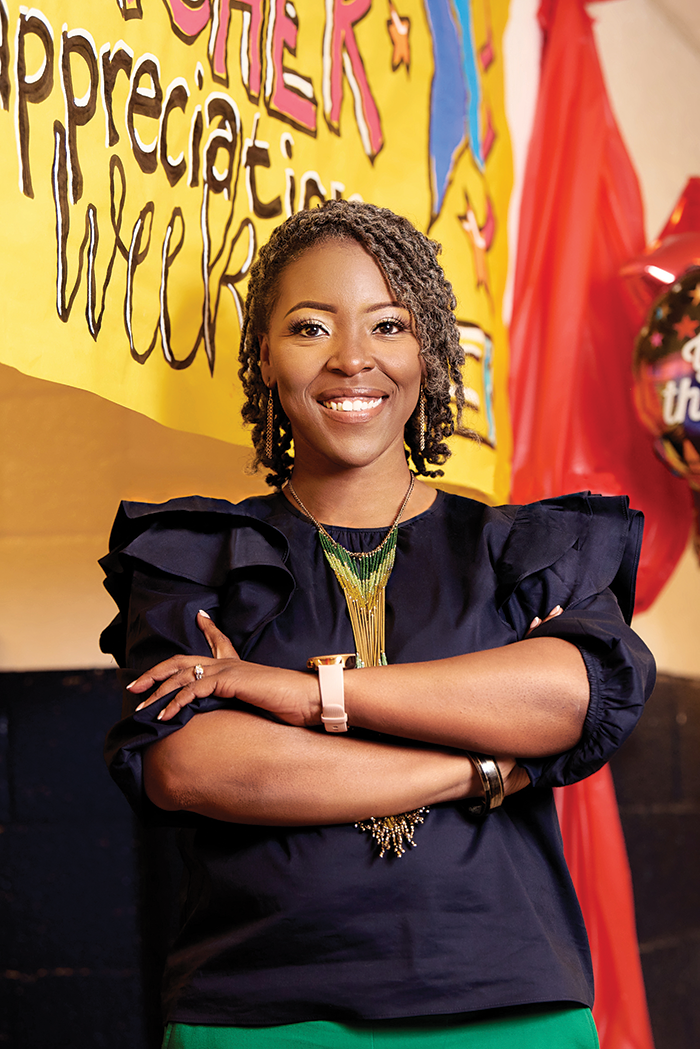Principal Jamilah A. Hud-Kirk serves in Clayton County Public Schools (Atlanta area) and collaborates with principals through Off School Grounds Coalition (OSG), a national organization founded by former principal Dennis McKesey. Hud-Kirk is a school leadership consultant, mentor, advocate for work-life balance and mother of five. She took time from her day to speak with Learning for Justice about the lessons of 2020-2021.
This conversation has been edited for length and clarity.
You have referred to this past school year as a “plan-demic.” What does that mean?
That’s a term from my OSG principal colleague, Aneesha Jacko. It’s a perfect description for this school year—a time for us to think differently about what our students’ needs are. Even before the pandemic, the things we were doing in education weren’t always working. Inequities didn’t start then—they were just magnified. We now have the opportunity to plan and work on the things that serve us best, personally and professionally. We have the opportunity to change what educating our scholars looks like.
As part of addressing the fear and trauma our school community experienced, last summer our district emphasized training on social and emotional learning (SEL) practices. We can proudly say that SEL is not something that we do now—it’s who we are. If it were not for those practices, our challenges probably would be even greater. We committed to implementing SEL throughout the day with students and staff. As a leader, it was important for me to ensure that we were also implementing SEL practices with our staff. We learned a lot about our strengths, and, despite the lows, there have been great highs. People took this time to grow themselves professionally, creatively—reconnecting and thinking differently. That’s the mindset we encourage with staff, students and parents.
The last year was pivotal. What should we leave behind in education, and what should we bring forward?
We need to leave behind limited mindsets. It’s about the work and making the impossible possible. If you’re intentional and your mindset is that there are no barriers, you will get more things done than you realize. Things such as SEL need to move forward. Pouring into our youngest children should move forward. Creating schools as hubs for the community needs to move forward. There was a time when school was a hub for all things and placed on a pedestal. We’ve got to get back to that. I am that principal who, when something is not right in my school, I take full responsibility. I have to make impactful change. But that change cannot happen without the support of the district, churches, businesses and families in our community. We all have to do our part.
Community in schools is essential. Our school, like a lot of Georgia schools, is considered a food desert. A newspaper article a couple years ago ranked all the state’s cities, and Forest Park was in the bottom five. We gave that article to our fifth graders that year and asked, “What would you do?” They said, “Well, can we do a school garden?” “Absolutely, let’s do a school garden, combat food insecurities in our area and share that food with other students and families.” We started that garden initiative. Out of the mouths of babes. If you empower them to make choices and give them information, they come up with pretty clever things. Get them to start thinking critically about social issues in their own backyards.
What are you looking forward to most about the next school year?
Opportunity, professionally and personally, and creating new norms. We found that when you create opportunities for your students, people recognize your efforts. I discovered that I had not been using my voice as much as I thought. In this pandemic, I learned to speak out about the things I want to manifest. As a result—because I’m trying to create that hub—we now have a nonprofit, Trinity of Faith, the Atlanta Food Bank and [Atlanta’s professional baseball team] sponsoring our school once a week providing 150 weekend bags of non-perishables to our scholars. This effort will continue over the summer. We also had authors Hal Elrod and Brianna Greenspan and the Miracle Morning community provide literature to every staff member and our families to support our school’s SEL practices. These are just a couple of examples.
You start doing things and have a limitless mindset that, “Whatever I want, I can get as long as I do the work,” and get the buy-in from staff and the community—it can really work. Principals all over the country are doing this work and transforming their communities. There are going to be challenges, but half the battle is mindset, really. That’s something we’re trying to teach our students. I pray that whatever we’ve taught the children here is enough that they will go out and, in turn, make a greater impact so that we can change some of these things that we’re seeing on the news and in our communities. Because if we don’t, shame on us. Shame on us. This is our time.
Jamilah A. Hud-Kirk has served for 12 years as principal at Fountain Elementary School in Forest Park, Georgia.


0 COMMENTS